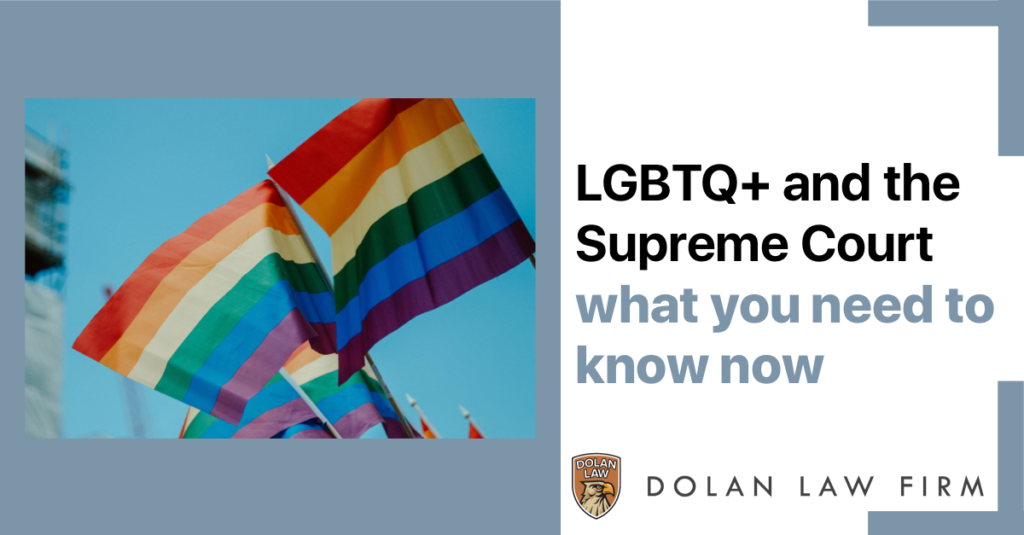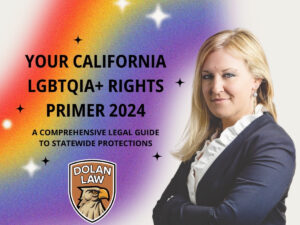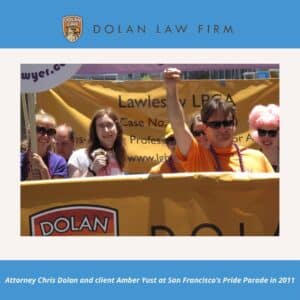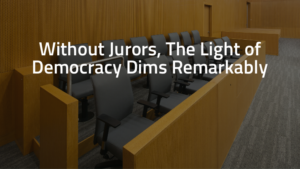Written By Christopher B. Dolan and Matthew D. Gramly
It is now early June, the time of year when the U.S. Supreme Court steadily releases all of the remaining opinions they have not yet released throughout the Court’s term. Since June is also Pride month, Court watchers are keeping an eye out this year for the Court’s opinion in a case involving adoptions of children by LGBTQ+ families. The case, Fulton v. City of Philadelphia, involves a religious-based adoption and foster care agency that refuses to provide any services to married same-sex couples. The agency’s denial of services is based on the religious beliefs of the Roman Catholic Archdiocese of Philadelphia, which runs the agency. Because of the denial of services to married same-sex couples, the City of Philadelphia canceled a contract with the agency because of this discriminatory practice. The Diocese thereafter sued the City, alleging that local regulations discriminate against the Diocese because of their religious beliefs.
One year ago, the United States Supreme Court handed down a landmark decision in support the LGBTQ+ community in holding that employers who terminate an employee because that employee is gay, lesbian, or transgender is in violation of Title VII of the 1964 Civil Rights Act. But one year ago, Ruth Bader Ginsberg was still on the Court. Today, Associate Justice Amy Coney Barrett occupies Justice Ginsberg’s former seat on the Court. And today, with the addition of Justice Barrett to the Court, there is a 6-3 conservative majority on the Court, including Trump’s other two appointees, Justices Kavanaugh and Gorsuch. It is a much different Court today than it was one year ago and no one knows quite what to expect on the Fulton case.
For more than 100 years the Roman Catholic Diocese of Philadelphia had run Catholic Social Services (CSS), a foster care agency in the city. CSS had a contract with the city to provide foster care and adoption services to the city’s residents and children under the terms of which CSS received taxpayer funds from the city. During an investigation in early 2018 Philadelphia’s main newspaper, the Philadelphia Inquirer, discovered that CSS had a policy of refusing to provide foster or adoption services to same sex couples. The paper notified the city’s Department of Human Services (DHS), the department overseeing and enforcing regulations for such foster care agencies, and asked if the city was aware of CSS’ policy. DHS discovered that only one other foster care and adoption agency in the city run by religious organizations (there were several) had a similar policy of discriminating against same-sex couples. DHS Secretary Cynthia Figueroa thereafter canceled CSS’ contract with the city because of CSS’ discriminatory practices.
CSS and the Archdiocese sued the City of Philadelphia pursuant to the Free Exercise Clause, the Free Speech Clause, and the Establishment Clause of the First Amendment to the U.S. Constitution. CSS also alleged religious discrimination had been perpetrated against them by the city government. The Free Exercise clause, accompanied by the Establishment clause, reads in relevant part, “Congress shall make no law respecting an establishment of religion, or prohibiting the free exercise thereof.” The contention was that Philadelphia’s city government, by canceling their contract with CSS because CSS did not provide services to same-sex couples, was using the power of government to discriminate against CSS and the Diocese solely because of the religious beliefs held by both; that by canceling their contract the city was preventing CSS and the Archdiocese from freely exercising their religious beliefs, and was using the power of government to disfavor the Catholic faith impermissibly.
The majority opinion in this case is due to be handed down by the Court any day now. The implications could be devastating to LGBTQ+ families and their ability to adopt children from adoption and foster care agencies run by religious organizations. As with most cases involving LGBTQ+ discrimination issues, it pits the right to be free from discrimination because of one’s sexual orientation against claims that “religious freedom” permits various churches and religious organizations to openly discriminate against people in the LGBTQ community because of deeply held religious beliefs.
The case was argued before the Supreme Court on November 4, 2020, the day after the 2020 election. Associate Justice Amy Coney Barrett had been on the Court for just ten days. It is important to note as well that all six of the Court’s conservative Justices, Chief Justice John Roberts, Clarence Thomas, Samuel Alito, Neil Gorsuch, Brett Kavanaugh, and Justice Barrett were all raised Catholic and all six remain practicing Catholics to this day.
Justice Ruth Bader Ginsberg spent her entire life fighting against discrimination of all kinds, including discrimination against the LGBTQ+ community. Following her death last year, Rea Carey, executive director of the National LGBTQ Task Force, said in a statement that,
“Justice Ginsburg was an American hero and pioneer, a voice for so many marginalized people, leaving behind a legacy of courage, tenacity, and historic impact in creating a better country and a better world for all of us. We are all so grateful for all Justice Ginsburg has done for LGBTQ people, for women, for our ability to control our own bodies, for all that seek to move freedom forward in this country.”
Justice Amy Coney Barret, on the other hand, belongs to a Catholic sect that believes wives should be subservient to their husbands and openly opposes both abortion and just about any rights extended to members of the LGBTQ+ community, even banning them from membership in the sect. One would be wise to not get their hopes up with regard to this particular imminent Court decision.










